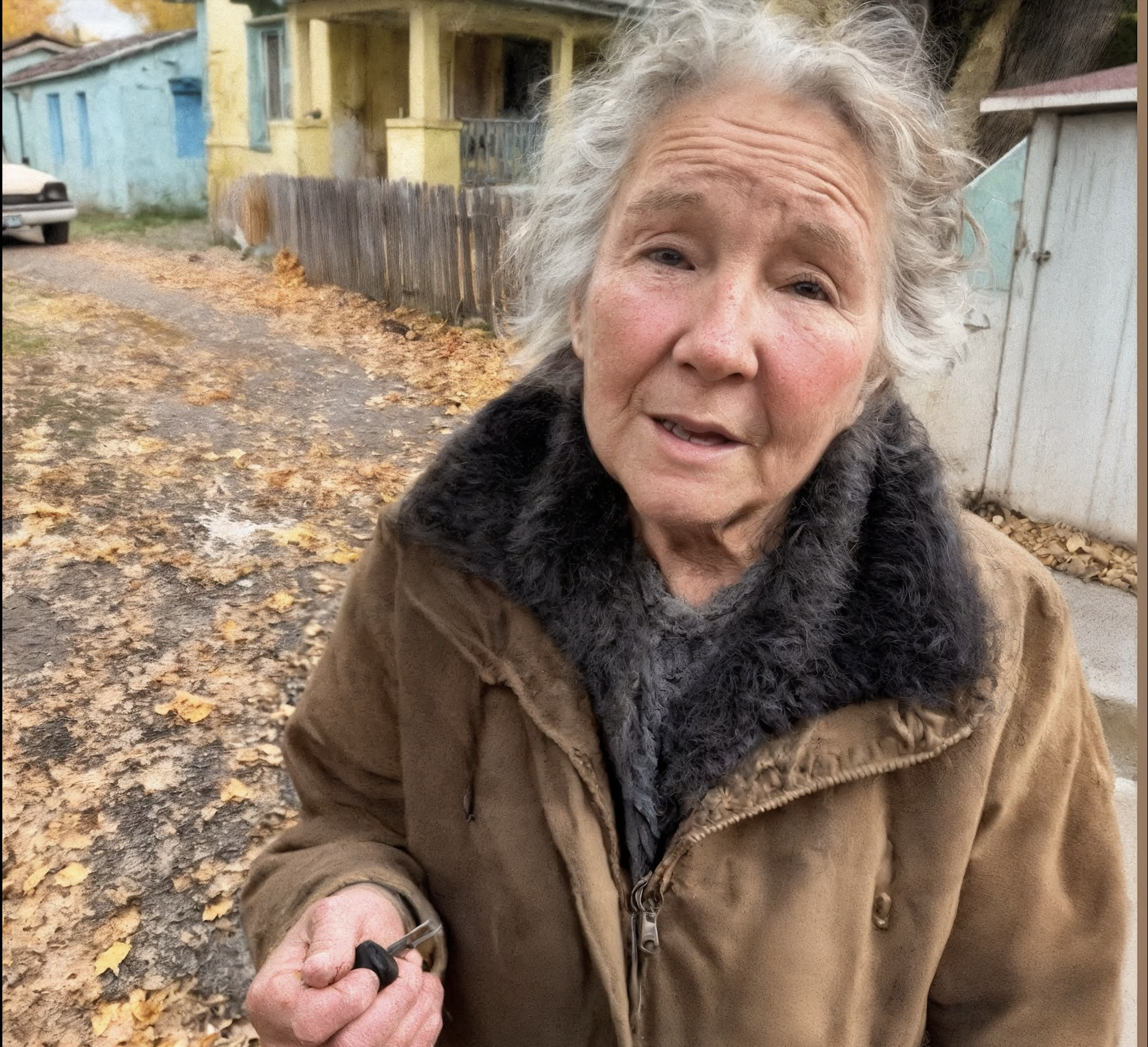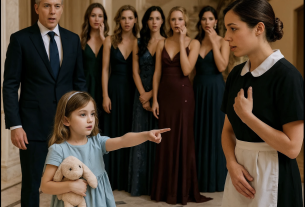After My Grandmother Died, My Husband Rushed Me to Sell Her House — But a Hidden Letter in the Attic Revealed a Secret That Changed Everything.
My name is Mira, I’m 36 years old. I live in a Portland, Oregon suburb, a small, quiet neighborhood where neighbors wave from their porches and kids ride bikes until the streetlights turn on. From the outside, my life probably looks like a postcard.
I’ve been married to Paul for seven years. He’s 38, tall and lean, always in an impeccable shirt and polished shoes, even on weekends. He works in finance, a job that keeps him glued to his phone most of the time, but at home, he easily embodies the perfect father.
We have twin girls, Ellie and June. They are four years old and, it seems, inherited everything from Paul: golden curls, dimples, and big blue eyes that sparkle whenever they’re about to get into mischief. I love them more than anything, even when they leave playdough stuck in the carpet or spill juice for what feels like the hundredth time on the sofa. From the outside, our life seemed perfect. We lived in a cozy house with white shutters and a lemon tree in the garden. On Sundays, we walked hand-in-hand to the farmers market, coffee in hand, while the girls chose tiny jars of honey.
Friday nights were movie nights at home, often Moana or Frozen for what felt like the millionth time, and the girls always fell asleep in a heap before the movie ended. Paul would carry them upstairs in his arms, and then we would finish the popcorn in silence.
He never forgot birthdays or important dates. Sometimes, I would find sticky notes on the bathroom mirror with little hearts drawn on them. He told me I was “the calm in his storm.” And I believed him. Truly. Because when you live love from the inside, it’s nothing like a fairy tale. It feels like gravity: discreet, constant, and always there.
But everything began to change the day my grandmother died. She was 92 and still lived in the small house where she had raised my mother. It sat, silent, on a hill surrounded by hydrangeas and old oak trees. That house was my second home when I was a child.
She made lavender cookies and served tea in mismatched cups while telling me about her childhood during the war. The whole house smelled of her: lavender soap, Earl Grey, and that powdery perfume she never stopped wearing.
Paul came with me to the funeral, holding my hand so tightly it almost hurt. I remember looking at him during the ceremony. His jaw was clenched. His eyes looked wet and tired.
I thought he was sharing my grief. I thought he understood. But today, I doubt it. After the ceremony, while the girls stayed with my sister, I went back to Grandma’s house alone to retrieve her last belongings. I wasn’t ready to say goodbye. Not yet.
Paul was not pleased.
“We need the money, not memories,” he snapped from the doorway, arms crossed, his voice low but cutting.
I turned to him, disconcerted. “Money? Paul, she’s been gone barely three days. Can’t we… slow down a bit?”
His gaze slid toward the staircase, then back to me. “I’m just saying it’s an old house. It needs work. We could use that money. You’re dragging things out.” I didn’t answer. I just stood there, clutching the blanket she always left on her armchair. My throat tightened, as if I had swallowed something thorny.
The sky outside was gray and low, the kind that presses down on your chest. Inside, everything felt heavy. Leftover pies from the funeral meal still lingered, empty glasses on the dining table, and that thick silence that settles in when everyone has left.
I walked slowly to her room. The bed still had the same flowered bedspread she’d owned for decades. I sat down carefully; the springs groaned softly, as if they were mourning too.
Paul walked in without knocking.
“Mira,” he said stiffly from the threshold, “it’s getting late. We should go.” “I just need a few more minutes.”
He sighed. “What’s left to pack? We’ve been here all day.”
I didn’t answer. I was staring at the photo on her bedside table. Grandma was holding me as a baby, and we were both laughing. Her laugh echoed in my head, sweet and gentle.
As I got up to leave, I heard someone call my name. I turned around: Mrs. Callahan, Grandma’s long-time neighbor, was standing just outside the gate. She looked around nervously, then whispered:
“If you only knew what your husband did here… while your grandmother was still alive.”
She slipped a small, antique key into my hand. I suddenly remembered—it was the attic key. “What do you mean, what my husband did? And how do you have this key?” I asked.
“It’s not my place to tell you,” Mrs. Callahan murmured. “Your grandmother gave it to me about a month before she passed. She asked me to give it to you personally.”
A strange shiver ran down my spine.
Paul had already returned to the car, tapping on his phone.
I took a deep breath and turned to Mrs. Callahan. “Thank you.”
She nodded and walked away without another word. I stood for a moment, my eyes on the key in my palm. Then I turned to Paul.
“Can you take the car and go back with the girls? I’ll call a taxi. I just… need a little more time.”
He looked up from his phone, frowning. “Seriously, Mira?”
He opened his mouth to protest, but something in my face stopped him.
“Fine,” he grumbled, brushing past me. “Don’t stay the night here.”
I watched him drive away, then went back into the house. My hands were trembling slightly as I climbed the stairs. The wood creaked under my feet, each step louder than I remembered. At the top, I hesitated. The attic door was small, repainted several times, and the handle was slightly crooked.
I slipped the key into the lock. It clicked.
My heart was pounding as I turned the handle and pushed the door open.
When I opened the attic, I didn’t know what to expect. Maybe a box of old photos, one of Grandma’s hidden cookie tins, or even a forgotten treasure from her past. I imagined a diary filled with memories.
But inside, it was… quiet. The air was dry and smelled of cedar and dust. The floorboards groaned under my steps as I walked forward. The single lightbulb flickered, then stabilized. Everything looked ordinary. Stacks of yellowed books, boxes with faded labels, a pile of carefully folded blankets in one corner.
And then I saw it. A brown leather suitcase was tucked against the back wall, its edges smoothed by time and use.
I gasped. I remembered that suitcase. When I was little, I would climb on top of it, pretending it was a pirate’s treasure chest. Grandma would play along, handing me chocolate “gold coins” and laughing every time I shouted, “Aye aye, captain!”
I knelt down and slowly undid the buckles. Inside, photo albums and envelopes were stacked, some bound with rubber bands about to snap. There were property documents, old insurance papers, bills, and right on top, an envelope addressed to me.
The handwriting was shaky, but it was definitely hers.
My throat tightened. My fingers trembled as I opened it.
The letter began: “If you are reading this, my darling, it means I have left this world. I kept some things from you to protect you. But even from up here, I will try to watch over you.”
I swallowed, already feeling a weight settling on my chest.
She wrote that about a year before her death, Paul had started visiting her in secret.
I blinked, confused at first. Then I read on.
He had told her she needed to sell the house and move to a facility. He claimed we needed money and warned her not to tell me anything, or my marriage would fall apart.
She explained that he came often, always well-dressed and outwardly polite, but with something cold in his eyes. At first, she had refused. She didn’t want to believe anything bad about the man I had married.
But Paul had insisted. He told her things that frightened her, about our finances, about me, and about losing the house if she didn’t act fast.
Finally, she had given in. She had signed preliminary papers, stopping short of the final sale. She deeply regretted it and wrote that she was sorry for listening to his lies.
My eyes burned. My hands were shaking so much that I had to rest the letter on my lap.
Then came the last part, lines I will never forget:
“If you can prove Paul deceived me, the house is yours. I’ve put all the documents in your name. Be careful, my darling. Paul needed a lot of money, and I don’t know why. I hope he won’t drag you and the children into his troubles.
— With all my love, Grandma Elizabeth.”
I stayed there for a long time, the attic suddenly colder. My mind was numb. I reread the letter. Then I reread it again. It was unthinkable.
Paul, the man who kissed me goodnight every evening, who helped bathe our daughters, who told me I was the love of his life, had blackmailed my dying grandmother.
I emptied the suitcase. There was the deed to the house, her will, the signed but incomplete sales agreement, and several other documents confirming everything she wrote. Months before her death, she had named me the sole beneficiary of the property.
When I went back downstairs, the sun had disappeared. I called a taxi and carried the suitcase to the curb. I didn’t go straight home. I stopped at a 24-hour storage facility and locked the suitcase in the smallest available unit. Then, I went to the bank and deposited the essential documents—the will, the deed, and the letter—in a safe deposit box in my name alone.
I didn’t sleep that night.
When Paul walked in the next morning, still in his shirt and tie, I was waiting for him in the kitchen.
“Where are the girls?” he asked lightly, putting down his keys.
“At my sister’s,” I said, staring at him. “I wanted to talk to you first.”
His smile faded. “Mira, what’s going on?”
I took a deep breath. “Why did you pressure my grandmother before she died? Why did you need money?”
His lips parted, but no words came out at first. Then he let out a short, forced laugh. “What are you talking about? Did someone tell you something at the funeral? You’re tired, Mira. You’re grieving. I understand.”
“No,” I said, calm but firm. “Don’t do that. Don’t try to make me doubt myself.”
He fidgeted. “That’s ridiculous.”
“I found her letter, Paul. I found everything. The deed is in my name. She wrote everything down. Word for word.”
That’s when I saw it: the flash of fear in his eyes. The mask began to slip.
“She misunderstood,” he hurried to say. “I didn’t force her. I wanted to help. The house needed work, and we’re not exactly swimming in money, Mira. You know that.”
“Why didn’t you talk to me about it?”
“I wanted to protect you. The investment… it was supposed to fix everything.”
I narrowed my eyes. “What investment?”
“Just tell me the truth,” I pressed. “Because I already know you lost money. What I don’t know is how much and where it went.”
He slumped into a chair, his face in his hands.
“A year ago,” he began, “a colleague—Jason—told me about a crypto startup. Golden information. Guaranteed returns. We would have tripled the money. I thought if I made a quick move, we wouldn’t have to worry about the mortgage, Ellie’s preschool, any of it.”
“So you gambled away our savings?”
“Two-thirds,” he whispered.
I gasped.
He continued: “When it all fell apart, I panicked. I started moving money around. I told you about supplemental taxes, the roof needing repair. I thought I could fix it before you found out.”
My fists clenched. “So, instead, you went behind my back and tried to coerce a 92-year-old woman into selling her house—the only place I’ve ever felt at home?”
“I didn’t mean for it to go that far.”
“But it did go that far. And you lied to me. For a year.”
He approached. “Mira, please. I messed up, I know. But I did it for us. For the girls. Don’t destroy our life over one mistake.”
“A mistake?” I laughed bitterly. “You drained our savings. You manipulated my dying grandmother. You made me doubt my own grief. That’s not a mistake, Paul. That’s who you are.”
We argued for hours. I screamed. He cried. He begged me not to break up our family and swore to make amends, to see a therapist, to be honest now. But I couldn’t even look at him anymore.
That night, I slept on the sofa. The next day, I called a lawyer.
By the end of the month, the divorce papers were filed. I didn’t scream or slam doors. I let my lawyer handle the chaos and protected the girls from all of it. Paul moved out two weeks later. I kept the house. The one that had never been his.
I had the locks changed. I repainted the living room. I found an old photo of Grandma and me cooking and put it on the mantelpiece. I framed her letter and placed it in my office, not as a reminder of betrayal, but as a reminder of love.
Because in the end, she protected me. Even from the man who had promised never to hurt me.
And that, more than anything, saved me.



